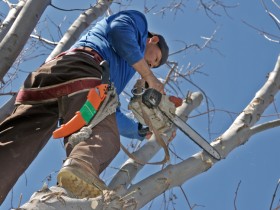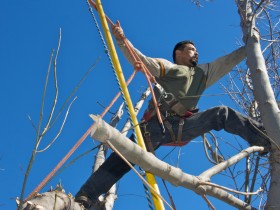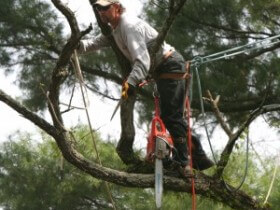In the world of organic gardening, there are plenty of great resources available to both new and experienced organic gardeners alike. There are many e-guides, books, videos, and other resources available. This set of tips contains some of the best advice for helping a good organic gardener become a great organic gardener.
Pay attention to how you lay sod. The soil requires preparation before sod can be laid. Do some weeding if necessary, then break the soil until it is no longer packed. The next step is compacting your soil and carefully leveling it. Water the soil until it is saturated. You should lay your sod staggered, and have the joints offset. Sod should be firm and have an even, flat surface without gaps. Water the sod every day for a couple of weeks. Then it should be rooted well and ready for foot traffic.
Clay is difficult to dig through with a shovel, as it is sticky and compact. Try applying a coat of wax onto your spade prior to working with clay soil, and then buff the spade head with a cloth. This will both make the clay fall off of the surface, and prevent the surface from rusting.
Start your plants in containers before transferring them to the garden. By allowing them to sprout first, you are increasing the odds of a seedling reaching maturity. This also helps tighten time between plantings. The seedlings are ready to go, once you remove the mature plants.
Measuring Sticks
Your tool handles can double as measuring sticks. You can use larger tools, like rakes, as measuring sticks. Just run some measuring tape right on the floor next to the handles. Next, use a Sharpie to accurately label the distance between each one. When the need arises to measure something while in your garden, the measuring tool you need will literally be “on hand,” sketched into the handles of your tools.
If mildew is forming on your plants, you should not purchase an expensive chemical. Plain water with a bit of liquid soap and baking soda will do the trick. Spray this mix on your plants every week and the mildew should go away. Baking soda will effectively remove the mildew without damaging your plants.
Transplanting plants and bringing them indoors can protect them from harsh winters. This is especially useful if you have a particular plant that you love or was expensive. Use caution when digging around the roots of your plant. You need to keep the root structure intact for it to thrive after being potted.
Take the time to remove weeds. Weeds can destroy a once promising garden and take away all its potential. To help with the removal, you can use white vinegar. You can use white vinegar to eliminate weeds! Try spraying some white vinegar in water when you are pulling weeds from your garden.
Vegetables should be placed in a spot in your garden that will get about six hours of sun every day. Many vegetables need about this much sun to grow quickly. The same can be said for some flowers.
Make sure that your deciduous shrubs are protected. Cold weather is very hard on these tender shrubs, and potted shrubs should be shielded and protected. Tie these canes at the top, and place a blanket over it. This method works better than covering your bushes in plastic, allowing air to circulate and preventing rotting.
In conclusion, the tips that you have read above should have you well on the path towards becoming the best organic gardener you can be. This is a field of endeavor where a wealth of useful information exists, and you have to delve into this knowledge. If you recall this advice, you can develop and hone your own techniques to create a flourishing organic garden.
A number of people would like to learn more about mdyhome.com, but not everyone knows where they should look. This article, luckily, is exactly what you need for that. Get out there and implement this information.




